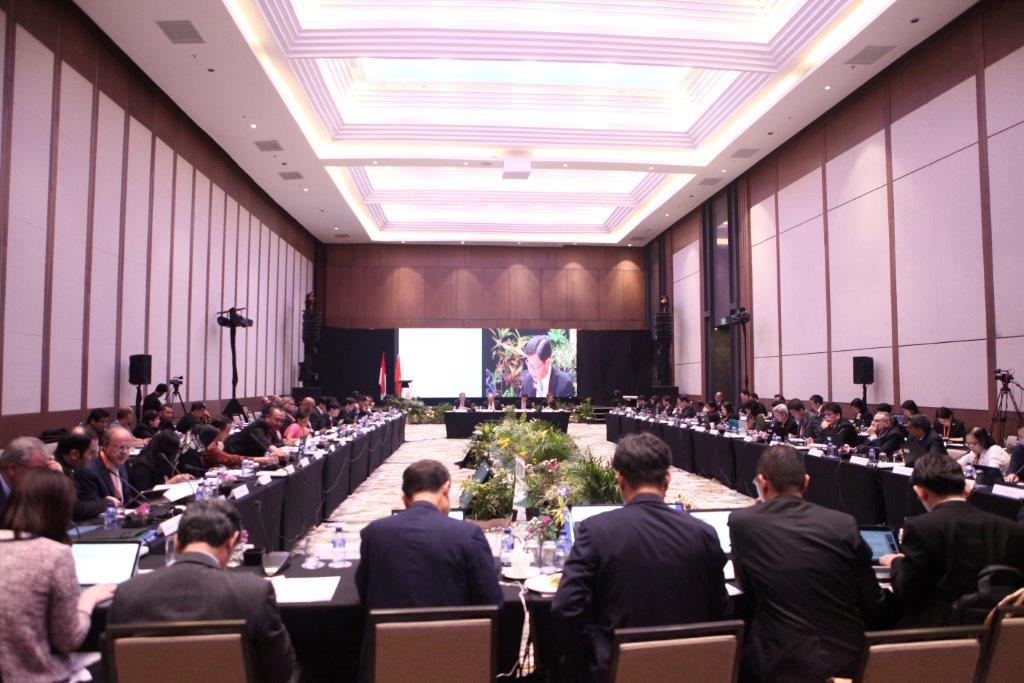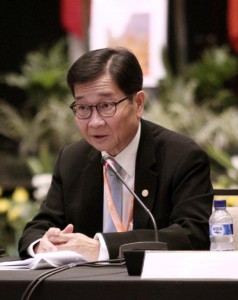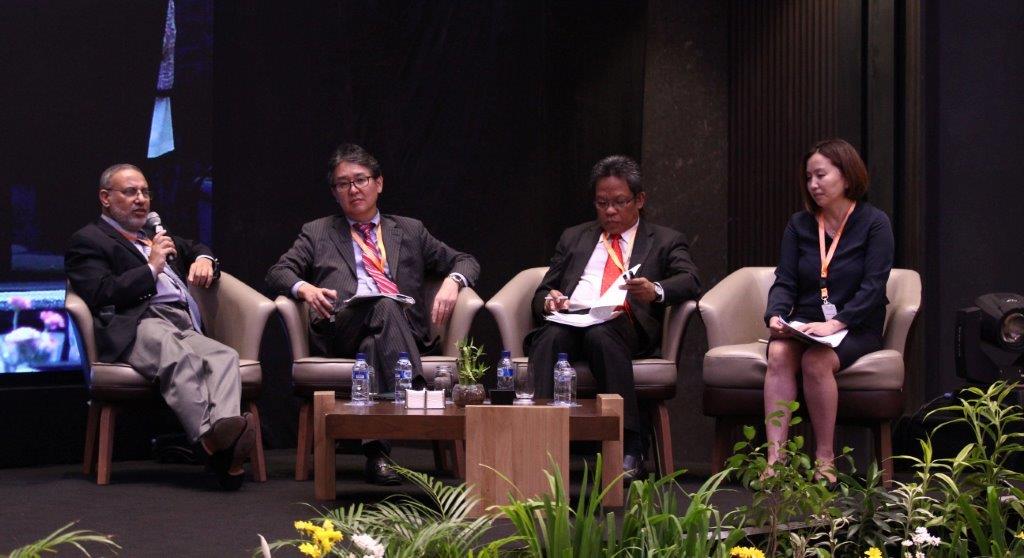
Select Page
The Asian Productivity Organization (APO) concluded its 59th Workshop Meeting (WSM) of Heads of National Productivity Organizations (NPOs) in Yogyakarta, Indonesia, 2–4 October 2018. The 58th WSM was attended by NPO representatives, agriculture delegates, and advisers from 19 APO members, along with observers from international partner organizations.

The WSM is the annual strategic planning meeting where APO member countries deliberate on the biennial program plan and review initiatives to ensure that they respond effectively to the requirements of their economies. The WSM 2018 agenda included a presentation of the impact evaluation study of 2016 and 2017 programs and reports on new initiatives proposed by the Secretariat.
Indonesia’s Minister of Manpower M. Hanif Dhakiri graced the WSM as its guest of honor. Delivering the inaugural address, Minister Dhakiri highlighted that Industry 4.0 had tremendous potential for overhauling the economy and changing various aspects of human life, with both developed and developing countries trying to extract benefits from it.
Sharing details of the steps taken by the Government of Indonesia to strengthen industry, Minister Dhakiri reported that the country had launched the “Making Indonesia 4.0” strategy and roadmap to develop a strong manufacturing sector. The initiative was launched by the Ministry of Industry and several relevant agencies and stakeholders, including the Ministry of Manpower. “The implementation of Industry 4.0 will be accelerated in five sectors: the food and beverage industry; textile and clothing industry; automotive industry; chemical industry; and electronics industry,” the minister explained.
“For Indonesia, the Industry 4.0 phenomenon anticipated through the Making Indonesia 4.0 initiative has given us very big opportunities for increasing the national commitment to work harder and faster in enhancing worker productivity and global competency,” he added, commenting that it would contribute substantially toward increasing national productivity and competitiveness in the global market.
In welcoming delegates, APO Director for Indonesia Bambang Satrio Lelono pointed out that the 59th WSM was important for making sure that APO member countries could benefit from the emerging Industry 4.0 phenomenon. “The long history of the effort to mainstream productivity into the policymaking process as well as development agenda in Indonesia has taught the important lesson that enhancing national productivity needs a strong commitment and concerted efforts at all levels, both national and regional, and in all dimensions, both micro and macro,” he stressed.
As 2018 marked 50 years of Indonesian membership in the APO, Director Lelono believed that it was the most appropriate occasion to invite all parties to accelerate efforts to increase productivity and competitiveness through the National Movement for Increasing Productivity and Competitiveness. He informed delegates that, “We are now preparing the blueprint and roadmap for the movement, which will elaborate all required elements and their mechanisms, while also establishing the institutional network with clear details of the structure, roles, and working mechanisms.”
Presenting his report to delegates at the opening plenary session, APO Secretary-General Dr. Santhi Kanoktanaporn emphasized that countries in the Asia and Pacific region, particularly APO members, needed to accelerate their transformation initiatives and approaches to improve productivity.
Stressing that transformation is a journey, Dr. Santhi said, “We are not going to achieve all the key transformations overnight but will do so progressively in collaboration with member governments, which also need to play their part to ensure success.”

APO Secretary-General Dr. Santhi Kanoktanaporn addressing the 59th Workshop Meeting of Heads of NPOs in Yogyakarta, Indonesia, 2 October 2018.
The Secretary-General stated that the major task before the WSM was to discuss how the APO could translate recommendations into action plans while balancing the commitments already made by member governments to the 2019–2020 Program Plan. He announced that the Secretariat was working to implement the Specific National Program and hoped that it would become the primary vehicle for the APO to co-create national productivity initiatives aligned with the specific needs of member governments. “Such initiatives focus on national-level impacts with advice from experienced international experts,” he noted.
Dr. Santhi also informed the meeting that the Secretariat aimed to establish an Accreditation Body Council comprising eminent representatives of member governments, academic institutions, and industry bodies. “This initiative will support member governments in developing new productivity knowledge and enhancing the APO’s standing as a leading productivity organization worldwide,” he stated.
WSM activities
The WSM agenda included adoption of the impact evaluation study of the 2016 and 2017 programs, presentation of reports on 2017 project evaluation and the Strategic Planning Workshop for Senior Planning Officers of NPOs, and a review of the APO Center of Excellence Program. During the plenary session, the Secretariat also introduced the Executive Development Program and updates on the enterprise resource planning roll-out at the Secretariat.
During the plenary session, presentations were given by representatives from Japan, Malaysia, and Mongolia on different productivity initiatives taken in their countries. The country presentation session was facilitated by NPO Delegate from Pakistan Abdul Ghaffar Khattak.
NPO Delegate for Japan and Managing Director of the Japan Productivity Center (JPC) Yukihiro Okawa reported on Japan’s Society 5.0 master plan with an emphasis on productivity. He focused on how productivity could be increased by improving output and new policy initiatives taken up by the JPC to drive the productivity movement in Japan. He also explained the concept of Society 5.0, a human-centered society that balances economic advancement with the resolution of social problems through a system that closely integrates cyberspace and physical space.

NPO Delegate for Malaysia Mohd. Razali Hussain presented Malaysian government initiatives to boost the nation’s productivity growth in its journey to become a high-income economy. He explained the transition of the Malaysia Productivity Corporation’s role and responsibilities since its establishment in 1960. In 2016, the Malaysian government launched the Malaysia Productivity Blueprint aimed at achieving the national productivity growth target of 3.7% by 2020.
Adviser for Mongolia Batbileg Tsagaan presented a paper on Public and Private Sector Collaboration in Promoting Productivity Initiatives in Mongolia. She cited the country’s GDP growth rate of 5.1% in 2017, up from 1.2% in 2016, with mineral commodities accounting for the bulk of the industry value added. She introduced the Mongolian Productivity Organization including its responsibility for promoting nationwide productivity and implementing programs to enhance the competitiveness of the private sector and efficiency of the public sector.
Earlier in the day, Adviser for NPO Indonesia Kunjung Masehat and NPO Delegate for the Republic of China Pao Cheng Chang were unanimously elected as Chair and Vice Chair of the 59th WSM, respectively. The WSM unanimously endorsed the documents and reference papers for submission to the 61st Session of the Governing Body (GBM) scheduled to be held in the Philippines in April 2019.
Two Strategic Planning Sessions (SPS) were conducted to review in detail the lineup of projects for the key business transformation. While Adviser for Indonesia Kunjung Masehat chaired the first SPS session to discuss Capability Development Programs and Individual-country Programs, the parallel breakout sessions for the Industry Transformation Committee was chaired by NPO Delegate for Malaysia Mohd. Razali Hussain. The parallel breakout session for the Agriculture Transformation Committee was chaired by Agriculture Delegate for Sri Lanka B. Wijayaratne.
The parallel breakout sessions commenced with a presentation by the Secretariat on the strategic approach taken to develop the project lineups for 2019 and 2020. The delegates discussed the programs and reconfirmed the hosting of projects as well as made minor adjustments in their titles and objectives and tentative schedules of implementation. In addition to the review by the delegates and reconfirmation by the host countries for the 2019 and 2020 projects for endorsement to the GBM, the sessions also focused on the objectives, outcomes, targets, measurements, and project plans for each initiative under the programs presented by the Secretariat.
During the three-day meeting, the representatives of 19 APO member countries reviewed proposed programs for the 2019–2020 biennium. The programs are aligned with the key business transformations introduced after a review of the Roadmap to Achieve the APO Vision 2020. New project proposals by the delegates were also discussed at the WSM. The 59th WSM concluded with the adoption of new initiatives and programs focusing on making the industry, agriculture, service, and public sectors in APO member countries more responsive, smarter, and future-ready.
In his closing statement, the Secretary-General stressed that the emergence of Industry 4.0 had made it imperative for economies to become proactive and avoid the business-as-usual approach. “We must adopt modern business management techniques and tools such as design thinking, multicollaboration, and intraentrepreneurship, as well as develop contextual awareness to anticipate the trends and disruptive technologies that will shape the future of our member economies,” Dr. Santhi said.
The WSM 2018 Chair and APO Alternate Director for Indonesia Kunjung Masehat stated that the key business transformation initiative was important and the time was appropriate for the APO to venture into new areas against the backdrop of Industry 4.0. “We have witnessed the most advanced innovations in science and engineering across the Asia-Pacific, and these technologies undergird industrial digitalization beneficial to APO member countries with technologies such as cognitive computing, visual analytics, additive manufacturing, industrial cyberphysical systems, and human–computer interaction,” he said.
The WSM Chair also reiterated that the APO Secretariat would continue to refine and adjust endorsed projects and activities to strengthen existing smart transformation and capacity development initiatives. “I am confident that the APO can address productivity challenges posed by disruptive technologies and meet the needs and expectations of member countries, while aligning activities with the strategic objectives of the APO Vision 2020 and remaining future oriented,” he concluded.
Photos: Directorate General of Training and Productivity Development, Indonesia’s Ministry of Manpower